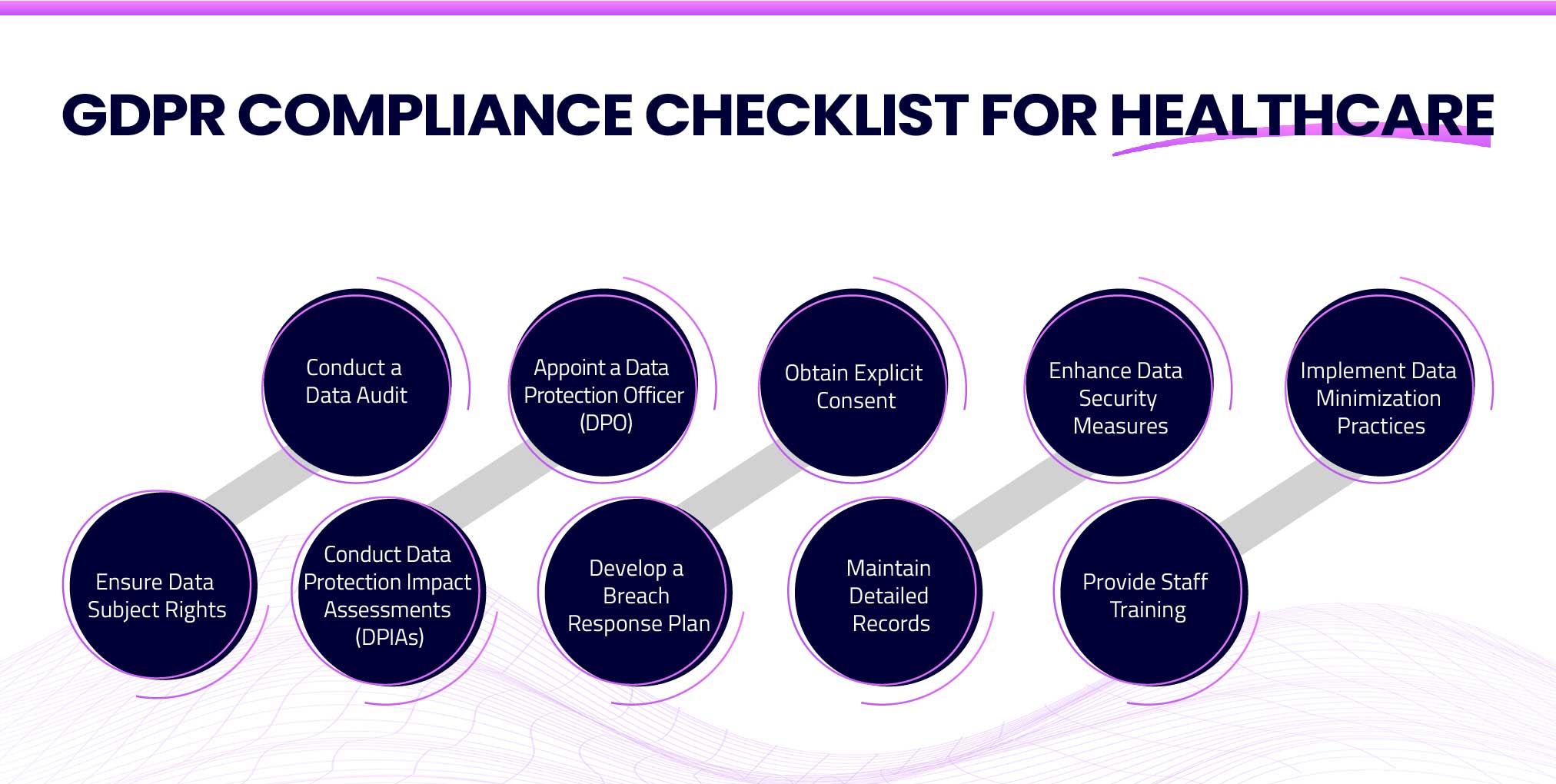

July 12, 2024
In today’s digital age, the handling of personal data has become a critical concern, especially for industries dealing with sensitive information like healthcare. The General Data Protection Regulation (GDPR) was implemented to ensure the privacy and protection of personal data within the European Union.
For healthcare companies, adhering to GDPR compliance is not just a legal obligation but a crucial step in safeguarding patient trust and maintaining ethical standards. This comprehensive GDPR compliance checklist will help healthcare organizations understand the complexities of the regulation, ensuring they meet all requirements.
In this blog, we will discuss the key components of GDPR compliance for healthcare companies, including understanding what GDPR compliance includes, the specific requirements for healthcare organizations, and a detailed checklist to ensure full compliance. We will also discuss the importance of patient privacy protection and provide practical steps to maintain GDPR healthcare compliance.

The General Data Protection Regulation (GDPR) is enacted by the European Union to protect the privacy and personal data of individuals within the EU. Implemented on May 25, 2018, GDPR sets strict guidelines for collecting, storing, and processing personal data, and applies to any organization that handles the data of EU citizens, regardless of its location.
For healthcare companies, GDPR compliance involves several key components:
Healthcare companies deal with sensitive personal data, including medical histories, treatment plans, and other health-related information. Ensuring GDPR compliance in the healthcare sector is essential to protect patient privacy and avoid significant penalties.
Patient privacy protection is a fundamental aspect of GDPR compliance. Healthcare organizations must take proactive steps to ensure personal data is handled with the utmost care and confidentiality. This involves implementing robust security measures, training staff on data protection practices, and regularly reviewing and updating data handling procedures.
Healthcare organizations face unique challenges when it comes to GDPR compliance. The nature of medical data, which is often detailed and highly sensitive, requires additional safeguards. Key requirements for GDPR healthcare compliance include:

To help healthcare companies achieve and maintain GDPR compliance, we have compiled a comprehensive checklist covering all essential aspects of the regulation.
Start by conducting a thorough audit of all personal data collected and processed by your organization. Identify the types of data, how they are collected, where they are stored, and who has access to them. This audit will help you understand the scope of your data processing activities and identify any potential compliance gaps.
If your organization processes large amounts of personal data or handles sensitive health information, appointing a Data Protection Officer (DPO) is mandatory. The DPO will oversee data protection activities, ensure compliance with GDPR, and serve as the point of contact for data subjects and supervisory authorities.
Ensure that you have obtained explicit consent from patients before collecting or processing their data. Consent forms should be clear, specific, and easily understandable. Patients should also be informed of their rights under GDPR, including the right to withdraw consent at any time.
Adopt data minimization practices to ensure that you only collect and process data necessary for the intended purpose. Avoid collecting excessive or irrelevant information, and regularly review your data collection practices to identify areas for improvement.
Implement procedures to facilitate the exercise of data subject rights, including the right to access, correct, delete, restrict, and object to data processing. Provide clear instructions on how patients can exercise these rights and ensure that requests are handled promptly and efficiently.
Implement robust security measures to protect personal data from unauthorized access, disclosure, alteration, or destruction. This includes encryption, access controls, regular security assessments, and staff training on data protection practices.
Conduct DPIAs for high-risk data processing activities to identify and mitigate potential risks to patient privacy. This involves assessing the impact of data processing on individuals’ rights and freedoms and implementing measures to address identified risks.
Develop a comprehensive breach response plan to ensure that your organization can respond quickly and effectively in the event of a data breach. The plan should include procedures for identifying and containing the breach, notifying affected individuals and supervisory authorities, and mitigating the impact of the breach.
Maintain detailed records of all data processing activities, including the types of data collected, the purposes of processing, and the security measures in place. These records will help demonstrate compliance with GDPR and provide a basis for regular audits and reviews.
Ensure that you train all staff members on GDPR compliance and data protection practices. Regular training sessions will raise awareness of data protection requirements and equip staff to handle personal data responsibly.
Xeven Solutions, as a leading AI healthcare company, understands the importance of protecting sensitive patient data following GDPR. Our team works diligently to ensure that our solutions are GDPR-compliant. We understand that complying with GDPR can be complex and overwhelming for healthcare organizations. That’s why we offer personalized plans and guidance to address any gaps and specific needs for compliance. With Xeven Solutions, you can rest assured that your organization is protected from potential data breaches while building a solid reputation in the healthcare industry.
Achieving GDPR compliance is not a one-time effort but an ongoing process that requires continuous monitoring, evaluation, and improvement. By following this GDPR compliance checklist for healthcare, organizations can ensure that they meet all regulatory requirements and protect patient privacy effectively.
Remember, GDPR compliance is not just about avoiding penalties but also about building trust with patients and demonstrating a commitment to ethical data handling practices. Regularly review and update your data protection policies and procedures to keep pace with evolving regulations and emerging threats.
By understanding the key requirements and following a comprehensive GDPR compliance checklist, healthcare organizations can ensure that they meet all necessary standards. For more detailed guidance on GDPR compliance, consider consulting a GDPR compliance guide or seeking advice from data protection experts.